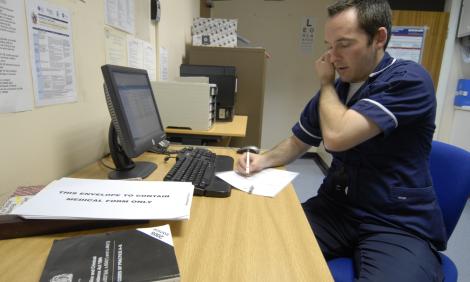Prison nurse
Nurses working in prison healthcare provide the same level of care and support as nurses in the community.
You'll provide primary care, mental health support or other specialist areas of work such as substance misuse needs or learning disability.
Working life
You'll work in a unique and diverse environment, delivering many of the nurse-led services that are provided in the wider community, with a unique opportunity to support someone throughout their time in prison and make a significant difference to the lives of people who have typically experienced health inequalities.
Working in a unique environment such as a prison, you’ll deliver compassionate care to patients from diverse cultural backgrounds who are vulnerable and have complex health needs. Your role often varies, allowing you to pick up additional skills and develop your knowledge.
The types of work you may do could include:
- health assessments
- mental health
- minor injury and illness
- end of life/palliative care
- substance misuse
- emergency and unscheduled care
- managing long-term conditions
- nurse consultation clinics
- safeguarding
As a prison healthcare nurse, you could work directly for the NHS or be employed by a private healthcare provider delivering services on behalf of the NHS. You could work in facilities for males or females, or in young offender institutions.
You’ll work alongside multidisciplinary teams including GPs, pharmacists, pharmacy technicians, support workers, dentists, podiatrists, physiotherapists, paramedics, psychological professionals, psychiatrists and a range of prison staff.
Entry requirements
To work as a nurse in prison healthcare you’ll need to be a qualified, registered nurse and hold a current registration with the NMC. Training will be provided to help you adapt to this unique environment. There is no specific qualification required to enable a nurse to work in prison healthcare. For example, you could have a background in general adult services, mental health, substance misuse or learning disability.
Informal visits and student placement/taster days are encouraged, so contact the relevant healthcare provider for the prison site for further details.
Anyone applying to work within a prison will go through an enhanced prison vetting process.
Must-have skills
You'll need resilience, patience and communication skills to be a prison healthcare nurse. Problem solving, compassion and being able to prioritise are also vital. Conflict management skills and a good knowledge of the criminal justice system and how it relates to the role will also help.
Training
You will be trained on prison-related aspects of your work. Prison-specific training is also available, including healthcare manager leadership training, vocational qualifications in custodial healthcare and transcultural healthcare practice training. Comprehensive induction programmes are usually available through your employer.
Career development
The partnership between the prison service and the NHS-commissioned services often means that work and development opportunities are available to you in both organisations at the same time. There are several routes for prison nurses to further their careers. These include opportunities in management, education and research. You may want to specialise in a specific area of prison nursing such as mental health or substance misuse. You could also move into more senior roles within the prison service or GP practices.
Alongside prison healthcare, NHS England health and justice also commissions other healthcare services within the criminal justice system. These include liaison and diversion services based within the police and courts, mental health treatment requirements for those with community sentences, young offender institutes and RECONNECT care after custody services. It also commissions further health services in the criminal justice system, sexual assault referral centres, immigration removal centres, young offender institutions, Secure Training Centre for children and young people, and secure children's homes.
You will be able to use the knowledge you gain of healthcare in the criminal justice system to move between roles in these services (please note, most but not all employ nurses). To find out more about commissioned services and the roles within view them on the Introduction to Health and Justice Careers e-module available on e-learning for healthcare, or on the NHS Health and Justice web page. The roles employed within health and justice-commissioned services are also covered in the respective Career and Competence Frameworks for the adult secure and detained estate, children and young people complex needs pathway and those services that are not based within custody.
Pay and conditions
Your standard working week will be around 37.5 hours if you are employed by the NHS and paid on the Agenda for Change (AFC) pay system, typically starting at band 5. Private providers adopt a similar, equivalent system.
You’ll also have access to our generous pension scheme and health service discounts, as well as at least 27 days of annual leave plus bank holidays.





